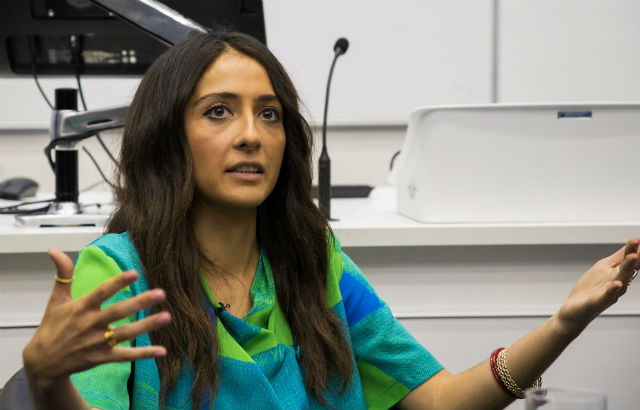
A photograph of the author Maya Goodfellow
Maya Goodfellow is a writer, academic and broadcast commentator. She is the author of Hostile Environment: How Immigrants Became Scapegoats. The book explores the discourses surrounding immigration in the UK and is based on interviews with politicians and immigration lawyers as well as immigrants themselves.
Speaking to Professor Tim Bale at the Mile End Institute, Dr Goodfellow reflected on her reasons for writing the book. “The various responses to the Brexit referendum made me concerned that people had an incorrect understanding of Britain’s history,” she said in reference to Britain’s colonial past. She also pointed to the 2015 general election campaign in which there was “no robust challenge to anti-immigration sentiments” from mainstream political parties.
A shift in discourse takes time
Dr Goodfellow stated that her book was an attempt to write a contribution on immigration that was accessible to the wider public. Whilst she acknowledged that much progress had been made in terms of tackling racism, the Race Relations Act being one example of an achievement in this area, deeper ideas about whiteness and Britishness have persisted and that a change in discourse will take time.
Dr Goodfellow said: “Language allows politicians to pave the way for restrictive immigration policies […] We need to analyse the broader political picture as well.” Pointing to the racially charged nature of the immigration debate, she referenced othering of immigrants as a tool in which groups are specifically targeted. “Who is the ‘us’ and who is the ‘them’? When people are talking about illegal immigration they are not talking about white Australians who have overstayed their visas.”
A clash of cultures?
Professor Tim Bale referenced polling that suggested some immigrant groups had different views to topics such as women’s rights and LGBTQ equality. Dr Goodfellow responded: “Violence, misogyny and homophobia are issues across all of society […] to say it is embedded in one culture, in a way we don’t talk about white western culture is problematic.”
“When scientific racism was deemed to be no longer acceptable, cultural differences were flagged. It is a convenient way to package arguments about race […] it’s clever, it’s subtle, but I still think it’s about race,” she added.
On the question of pressure on public services, Dr Goodfellow believes that this is due to lack of planning rather than a problem related to immigration. She highlighted the recent public outcry over the Windrush scandal as evidence supporting her belief that it is possible to change the tone of the debate when it comes to immigration. “The government at the time didn’t think that people would care about black Britons, they took a gamble,” she said.
More information
